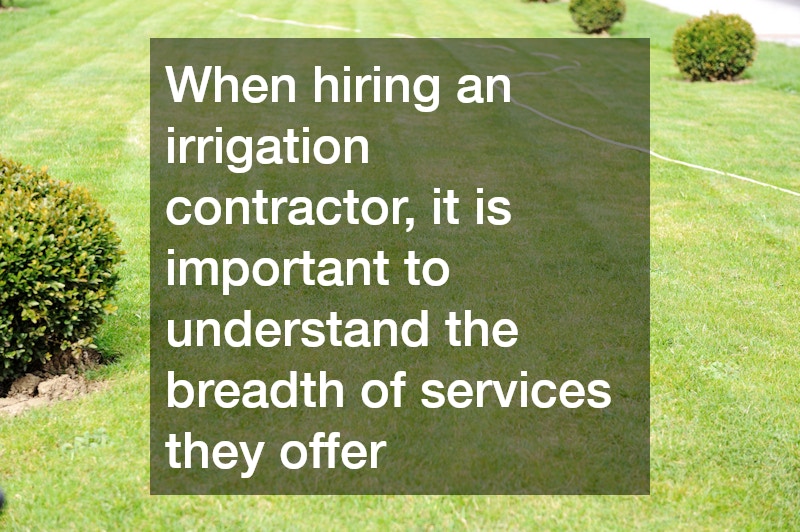An irrigation contractor is an expert specializing in the design, installation, and maintenance of irrigation systems. These professionals ensure that landscapes are efficiently irrigated, minimizing water wastage and enhancing plant health. The role of an irrigation contractor extends beyond mere installation; they also provide valuable guidance on choosing the right systems tailored to the specific landscape needs.
With climate and environmental consciousness rising, hiring a knowledgeable irrigation contractor can significantly impact environmental sustainability. Their expertise plays a crucial part in ensuring that your landscaping project is both water-efficient and cost-effective in the long run.
When hiring an irrigation contractor, it is important to understand the breadth of services they offer. From rainwater harvesting systems to drip irrigation setups, these professionals cover a wide array of irrigation needs. The contractor’s role also involves ongoing system evaluations and adjustments, making sure that the irrigation setup continues to meet the demands of its environment. An effective irrigation contractor not only focuses on the technical aspects but also educates property owners on maintaining their irrigation systems. This ongoing support and education can help clients achieve optimal performance from their irrigation systems, ensuring a lush and healthy landscape.
One fact to consider when hiring an irrigation contractor is that a well-designed system can save up to 50% more water compared to a traditional one. This significant water saving is made possible by the precise and efficient methods employed by experienced contractors. Their technical skills allow them to create tailored solutions that address specific challenges of a landscape. Furthermore, understanding the local ecosystem and climate dynamics enables contractors to make informed decisions. Ultimately, this expertise helps clients conserve water resources, which is increasingly critical in regions that face water scarcity.
Credentials and Experience
Credentials are a vital consideration when selecting an irrigation contractor. Certification and licensing demonstrate the contractor’s competence and adherence to industry standards. In many regions, certifications from recognized bodies like the Irrigation Association (IA) indicate a professional level of expertise. Additionally, a licensed contractor assures compliance with local regulations, ensuring that your system is installed according to municipal codes. Remember, a reputable contractor should willingly provide proof of their credentials and explain how their qualifications benefit your specific project.
Experience in the field is equally important, as it often dictates the contractor’s ability to handle complex irrigation challenges. Contractors with extensive experience bring a wealth of knowledge and practical problem-solving skills to the table. Such experience is particularly beneficial in troubleshooting unforeseen issues and ensuring that systems operate seamlessly over time. Checking for client testimonials and case studies can provide insight into the contractor’s track record and customer satisfaction. Ultimately, choosing a contractor with a proven history of successful projects can instill confidence in the quality of their services.
It’s wise to ask potential contractors for references from previous clients. Speaking with past clients provides firsthand insights into the contractor’s reliability, punctuality, and workmanship. Questions regarding any challenges faced and how they were resolved can give you a picture of the contractor’s capability to manage and adapt to evolving project requirements. Additionally, examining before-and-after photos of past projects might offer visual assurance of a contractor’s skill set. Remember, a contractor’s portfolio not only showcases their technical abilities but also their creativity in addressing unique landscaping needs.
Cost and Contracts
Understanding the cost structure is essential when hiring an irrigation contractor to ensure there are no surprises down the road. Reputable contractors should provide detailed quotes outlining the necessary materials, labor charges, and any potential additional costs. Comparing quotes from multiple contractors can help you understand the market rate and negotiate better deals. Keep in mind that while cost is an important factor, it should not be the sole determinant of your decision. Quality and reliability often come at a price, and investing in a competent contractor can save you money on future repairs and inefficiencies.
Contracts are fundamental to laying down the expectations and obligations of both parties involved. It’s crucial that the contract specifies the scope of work, payment schedules, timelines, and any warranty terms. A clear contract protects against misunderstandings and provides a basis for resolving disputes. Be cautious of contractors who push for upfront payments or lack a formalized contract, as this may indicate potential issues. Ensuring all agreements are in writing can safeguard your investment and ensure that deliverables align with your expectations.
During contract discussions, inquire about any maintenance plans or follow-up services included in the agreement. Many reputable contractors offer routine check-ups and system evaluations as part of their service package. Ensuring your system remains efficient over time can prevent costly repairs and water wastage. Understanding the nuances of such plans can also influence your overall satisfaction with the contractor’s services. Ultimately, a well-documented and communicated contract establishes a solid foundation for a successful partnership with your irrigation contractor.
Evaluating Technology Use
The use of technology in irrigation systems is rapidly evolving, offering homeowners and businesses advanced solutions for water management. Modern irrigation systems often incorporate smart technology, including sensors and remote controls to optimize water usage. When considering an irrigation contractor, evaluate their familiarity and experience with these technological advancements. Contractors adept in smart technology can offer systems that automatically adjust to weather changes, soil conditions, and plant needs. Integrating such technology can significantly enhance the efficiency and convenience of your irrigation system.
A skilled irrigation contractor should also be able to advise on the best technological solutions for your landscape. This involves assessing the specific needs of your property and recommending suitable systems and components. Smart irrigation controllers, rain sensors, and soil moisture sensors are just a few examples of technology that can be utilized for efficient water use. Furthermore, understanding these components’ installation and maintenance is crucial in ensuring they function correctly and sustainably. By leveraging the latest technological advancements, an irrigation contractor can help you conserve resources while maintaining a healthy landscape.
It’s worthwhile to ask potential contractors about the brands and types of technology they recommend and their compatibility with existing systems. Contractors who regularly update their knowledge of industry trends can provide you with cutting-edge solutions. Additionally, workshops or training sessions offered by manufacturers might also be indicators of a contractor’s commitment to staying informed. Familiarity with the latest innovations ensures that the contractors can offer systems that are both effective and forward-compatible. Ultimately, technology use is becoming increasingly important in irrigation, and hiring a contractor who understands this can add significant value to your project.



